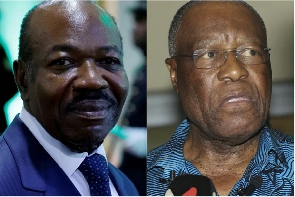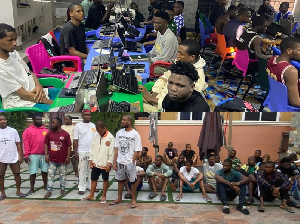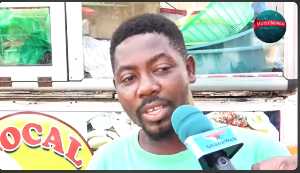About 850,000 people are eligible to vote on Saturday when Gabon chooses a president and members of parliament simultaneously on a single ballot paper under a new electoral system.
President Ali Bongo, who has served two consecutive seven-year terms, is standing for a third.
The new electoral system is the result of a constitutional reform adopted in April. Among its key measures are the standardization of all political terms of office to five years and the abolition of a second round in presidential elections.
There are no term limits in Gabon, so if Bongo keeps winning elections, he could be president for life and extend his family’s hold on the Central African nation.
Bongo is the candidate for the ruling Gabonese Democratic Party (PDG), the party founded by his father, Omar Bongo, who ruled with an iron fist from 1967 to 2009. After his death, his son, then the defense minister, took his place as president and has ruled ever since.
Until last week, 19 candidates were to run for the presidency in this election.
But on August 18, six candidates sprang a surprise by forming the Alternance 2023 coalition, naming independent candidate Albert Ondo Ossa as their joint candidate.
“Gabon is not the property of the Bongos,” he said after the announcement.
Ossa, an economics professor and education minister under Omar Bongo, was also a contestant in the 2009 election. The opposition candidate told Al Jazeera in an exclusive interview that he is sure of victory this time because “today people realize that [the president] has impoverished the country.”
‘A change of government’
The merger, according to economist and political analyst Mays Mouissi, is the opposition’s best bet to get enough votes to put an end to the Bongo dynasty.
“[This] really means a change of government and a change of leader at the head of the state,” he told Al Jazeera.
Indeed, for many people who have not known another leader outside the Bongo family, there is talk of a need for change.
The president counts successes in environmental conservation and regulation of natural resources as well as the construction of the Owendo commercial port as highlights of his tenure. But his critics say there is not much that he has done otherwise.
With an oil-based economy, Gabon has long been seen as a country with great economic potential, but it has been plagued by endemic corruption.
In 2022, Transparency International ranked Gabon 124th out of 180 countries on its Corruption Perceptions Index.
Citizens said they encounter corruption in the most basic of procedures, including in job recruitment schemes in a country with high unemployment. Justice can often be procured from the courts for a small fee too, some said.
The Bongo family has been involved in a series of major scandals, including most recently, the July 2022 indictment of five of the president’s siblings in a French investigation of embezzlement and laundering of public funds.
Meanwhile, a third of Gabon’s 2.5 million people live in poverty, and basic social services are also lacking despite it having one of the highest gross domestic products per capita on the continent.
“It’s not a very glorious performance,” Mouissi told Al Jazeera of Ali Bongo. “He has only kept 12 percent of his promises. … Quality of life has deteriorated. … Poverty and unemployment have risen by three or four [percentage] points between the previous presidential election and this election, and that’s something I can tell you as an economist.”
The Bongo system
The situation has been worsened by the uncertainty surrounding the president’s health.
In 2018, Bongo suffered a stroke during an official trip to Riyadh, Saudi Arabia’s capital. The stroke prevented the president from carrying on in an official capacity for several months and led to political instability, culminating in an attempted coup. He was also absent from any public functions for 10 months, reappearing in August 2019.
Bongo, nevertheless, remained in office although his physical and mental capacity to lead the country continues to be questioned.
During that time, the COVID-19 pandemic caused a slowdown in the economy for two years as a strict curfew was observed months after restrictions were lifted in other countries. Then there was the war in Ukraine, which broke out in February 2022 and had an impact on energy and food prices, creating public frustration.
That, analysts contend, is proof that Bongo’s last term has been unproductive.
“Ali Bongo has been running the country for 14 years, and his record over his two terms in office is really not that great,” Mouissi said. “As I speak now, there are several districts in Libreville that have no water. It’s because the government has not invested enough in this infrastructure. We were supposed to increase the country’s electrical power, [but] none of the five dams that were planned have been built. But there are people who benefit from this regime, and they will do everything to maintain it.”
Since 2009, the legitimacy of Bongo’s presidency has been a matter of debate. He was installed after riots followed elections shrouded by alleged rigging. The next election was also marred by irregularities and suspicions of massive fraud. When the results were announced, demonstrations contesting the outcome were dispersed with tear gas and then gunfire.
“At the time, the president was elected because, in his home province, he had officially carried the day with 99.93 percent of the vote. When you look at the details of this result, out of 100 percent of those registered, 99 percent voted, and out of the 99 percent who voted, 99.93 percent voted for Ali Bongo. It’s impossible,” Mouissi explained.
The president’s rivals say a continuation of the status quo benefits the ruling PDG, which has been in power for more than half a century and is unlikely to relinquish power easily. So they said they expect another flawed election.
“We’re talking about a family that has held power for a long time – in business not because they’re very democratic but because they waste and embezzle public money,” said Erichk Mauro Nguemah, who was a presidential candidate in the 2009 election.
A lot of uncertainty
This time it is not just electoral fraud worrying the opposition, but the ballot itself.
Just six weeks to the election, the authorities decided that the legislative and presidential elections would be conducted using a single ballot paper instead of separate ones for each position.
In a country where the priority is voting for the president and where opposition candidates are often independents who stand without parliamentary candidates, voters often abstain from choosing legislative candidates.
Consequently, the chances of having independent members of parliament are low.
Since being chosen as Alternance 2023’s presidential candidate, Ossa has embarked on a series of nationwide rallies at a frenetic pace while calling for a boycott of the legislative elections.
Ossa said he would call for new legislative elections if elected president, a decision that would be in line with the Gabonese Constitution, which allows the dissolution of parliament for a new vote.
It remains to be seen whether enough voters understand the new voting system, given its introduction just before the elections and a lack of communication from the electoral commission. All this uncertainty could end up being to the benefit of the ruling party, analysts said.
Africa News of Saturday, 26 August 2023
Source: aljazeera.com













